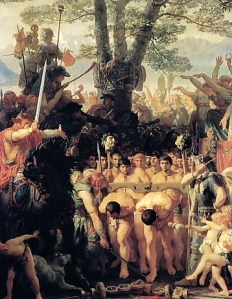Is there truth in twitter?
Published on 01 February 2012
Updated on 05 April 2024
Updated on 05 April 2024
(In praise of fuzzy thinking)
Jovan argues in his post: “The speaker’s words must pass through the tough filter of relevance before being transmitted…” twitter format providing the filter. This image comes to mind… where twitter is the yoke (and my joke) In order to reply to Jovan’s assertion, let me make a long detour. Ever since “life” emerged storing and shifting information through time (rather than synchronous sharing) – i.e. creating and shaping memory – was the challenge. The world of genes emerged as the solution. The system was error prone – the collateral effect was “life’s” diversity. Enter mankind. Next to genes, information was stored symbolically, and passed on to the next generation through culture. Most of it is unconscious (what one calls silent culture), and increasing amount is conscious (crafts, rituals and stories). The latter is particularly error prone. The ability of mankind to use all ecosystems, instead of specializing, rests however on our ability consciously to capitalize on error through adaptation. Fuzzy thinking made us what we are today. Lacking writing, rituals and stories were the best thing we could come up with in transmitting conscious knowledge[1]. Crafts and rituals are embedded in reality; stories rely on memory only. Particularly in the latter case, the message soon gets garbled as it is transmitted – less than one hundred years, unless verified against context. Writing saved the day: it allowed us partially to overcome the loss of content in memory transmission. This improvement came at a large price: for lack of use we lost – without really noticing – many unconscious skills buried in silent culture[2]. Just as culture allows quick acquisition, it also allows quick deletion of information: “use it or lose it” particularly applies to culture. And we also lost many crafts and rituals for cooperation. This is what King Thamus warned Theuth about. The price of learning one skill (writing) well was de-skilling of many other areas. Jovan’s argument then is “survivor bias” – he has improved one skill but failed to notice all that he has given up. But has Jovan truly gained something – in the end? I quote[3]: “The philosopher Bernard WILLIAMS writes scathingly about the ‘fetish of assertion’, that impulse to ram home your case as though its content is all that counts.” (p. 18). Jovan believes that essence can be divorced from context. In fact most of the content is in the context, and eliding it is a genuine and serious loss of information (the heads on the pike in the painting above). As the content is boiled down, its contextually rich meaning is twisted into naked certainty that obliterates all other possibilities as well as qualifications and relations. Even if Jovan had distilled the essence, there is the problem of reception (and transmission). Jovan implicitly assumes that (a) he can read the speaker’s mind, (b) he understands his listener’s mind well enough to assume perfect reception. Also nothing gets lost in transmission. A tall set of assumtions, which he backs up by eliding all redundancy. Even if distilling essence were truly possible – it would be an elite skill. Plato said as much, reserving it for philosophers. So even if Jovan were net not to suffer “de-skill”, many others would. This again is a dangerous thing to do, for adaptability is an essential human skill. De-skilling the many is not a wise policy, yet we have been doing it now since we discovered “division of labor”. Humans are unique among animals in their ability to agree on goals and cooperate. Contrary to Western opinion, our strongest survival skill is not to work from truth or toward truth, but our ability to “muddle through” from uncertainty. True, division of labor has brought us where they are now. We may have reached a point, however, where “division of labor” may be undermining the very source of our success – cooperation and the fuzzy social skills that underlie it. Whether twitter is a good or a bad thing will depend on the context. I can see the balance shifting every day. I see my task – as contrarian – to remind people of the importance of context, hence of balance. Truths and absolutes only thrive in the never never land of theory. We venture into that desert at our peril.
[1] See: Elizabeth Wayland BARBER – Paul T. BARBER (2004): When they severed earth from sky. How the human mind shapes myth. Princeton University Press.
[2] As always when we deal with life, the boundaries are messy. Culture codes to our synapses, and thus secures knowledge biologically. But ony part of the synaptic wiring is transmitted biologically.
[3] Richard SENNETT (2012): Together. The rituals, pleasures and politics of cooperation. Yale University Press.


Leave a Reply
Want to join the discussion?Feel free to contribute!